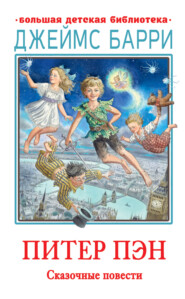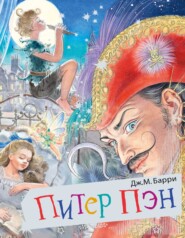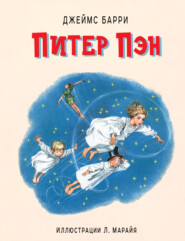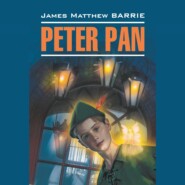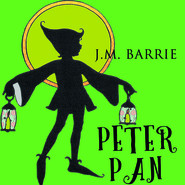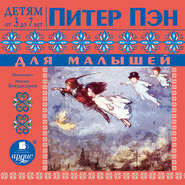По всем вопросам обращайтесь на: info@litportal.ru
(©) 2003-2025.
✖
The Little Minister
Настройки чтения
Размер шрифта
Высота строк
Поля
“I know whom you mean,” I said. “That was our last day together, but you were not three years old. Yet you remembered me when you came to Thrums. You shake your head, but it is true. Between the diets 300 of worship that first Sabbath I was introduced to you, and you must have had some shadowy recollection of my face, for you asked, ‘Surely I saw you in church in the forenoon, Mr. Ogilvy?’ I said ‘Yes,’ but I had not been in the church in the forenoon. You have forgotten even that, and yet I treasured it.”
I could hear that he was growing impatient, though so far he had been more indulgent than I had any right to expect.
“It can all be put into a sentence,” I said calmly. “Margaret married Adam Dishart, and afterwards, believing herself a widow, she married me. You were born, and then Adam Dishart came back.”
That is my whole story, and here was I telling it to my son, and not a tear between us. It ended abruptly, and I fell to mending the fire.
“When I knew your mother first,” I went on, after Gavin had said some boyish things that were of no avail to me, “I did not think to end my days as a dominie. I was a student at Aberdeen, with the ministry in my eye, and sometimes on Saturdays I walked forty miles to Harvie to go to church with her. She had another lover, Adam Dishart, a sailor turned fisherman; and while I lingered at corners, wondering if I could dare to meet her and her mother on their way to church, he would walk past with them. He was accompanied always by a lanky black dog, which he had brought from a foreign country. He never signed for any ship without first getting permission to take it with him, and in Harvie they said it did not know the language of the native dogs. I have never known a man and dog so attached to each other.”
“I remember that black dog,” Gavin said. “I have spoken of it to my mother, and she shuddered, as if it had once bitten her.”
“While Adam strutted by with them,” I continued, “I would hang back, raging at his assurance or my own 301 timidity; but I lost my next chance in the same way. In Margaret’s presence something came over me, a kind of dryness in the throat, that made me dumb. I have known divinity students stricken in the same way, just as they were giving out their first text. It is no aid in getting a kirk or wooing a woman.
“If any one in Harvie recalls me now, it is as a hobbledehoy who strode along the cliffs, shouting Homer at the sea-mews. With all my learning, I, who gave Margaret the name of Lalage, understood women less than any fisherman who bandied words with them across a boat. I remember a Yule night when both Adam and I were at her mother’s cottage, and, as we were leaving, he had the audacity to kiss Margaret. She ran out of the room, and Adam swaggered off, and when I recovered from my horror, I apologized for what he had done. I shall never forget how her mother looked at me, and said, ‘Ay, Gavin, I see they dinna teach everything at Aberdeen.’ You will not believe it, but I walked away doubting her meaning. I thought more of scholarship then than I do now. Adam Dishart taught me its proper place.
“Well, that is the dull man I was; and yet, though Adam was always saying and doing the things I was making up my mind to say and do, I think Margaret cared more for me. Nevertheless, there was something about him that all women seemed to find lovable, a dash that made them send him away and then well-nigh run after him. At any rate, I could have got her after her mother’s death if I had been half a man. But I went back to Aberdeen to write a poem about her, and while I was at it Adam married her.”
I opened my desk and took from it a yellow manuscript.
“Here,” I said, “is the poem. You see, I never finished it.”
I was fingering the thing grimly when Gavin’s eye 302 fell on something else in the desk. It was an ungainly clasp-knife, as rusty as if it had spent a winter beneath a hedge.
“I seem to remember that knife,” he said.
“Yes,” I answered, “you should remember it. Well, after three months Adam tired of his wife.”
I stopped again. This was a story in which only the pauses were eloquent.
“Perhaps I have no right to say he tired of her. One day, however, he sauntered away from Harvie whistling, his dog at his heels as ever, and was not seen again for nearly six years. When I heard of his disappearance I packed my books in that kist and went to Harvie, where I opened a school. You see, every one but Margaret believed that Adam had fallen over the cliffs and been drowned.”
“But the dog?” said Gavin.
“We were all sure that, if he had fallen over, it had jumped after him. The fisher-folk said that he could have left his shadow behind as easily as it. Yet Margaret thought for long that he had tired of Harvie merely and gone back to sea, and not until two years had passed would she marry me. We lived in Adam’s house. It was so near the little school that when I opened the window in summer-time she could hear the drone of our voices. During the weeks before you were born I kept that window open all day long, and often I went to it and waved my hand to her.
“Sometimes, when she was washing or baking, I brought you to the school. The only quarrel she and I ever had was about my teaching you the Lord’s Prayer in Greek as soon as you could say father and mother. It was to be a surprise for her on your second birthday. On that day, while she was ironing, you took hold of her gown to steady yourself, and began, ‘Πάτερ ἡμῶν ὁ ἐν τοῖς οὐρανοῖς’ and to me, behind the door, it was music. But at ἁγιασθἠτω, of which you made two syllables, you 303 cried, and Margaret snatched you up, thinking this was some new ailment. After I had explained to her that it was the Lord’s Prayer in Greek, she would let me take you to the school-house no more.
“Not much longer could I have taken you in any case, for already we are at the day when Adam Dishart came back. It was the 7th of September, and all the week most of the women in Harvie had been setting off at dawn to the harvest fields and straggling home at nights, merry and with yellow corn in their hair. I had sat on in the school-house that day after my pupils were gone. I still meant to be a minister, and I was studying Hebrew, and so absorbed in my book that as the daylight went, I followed it step by step as far as my window, and there I read, without knowing, until I chanced to look up, that I had left my desk. I have not opened that book since.
“From the window I saw you on the waste ground that separated the school from our home. You were coming to me on your hands and feet, and stopping now and again to look back at your mother, who was at the door, laughing and shaking her fist at you. I beckoned to you, and took the book back to my desk to lock it up. While my head was inside the desk I heard the school-house door pushed open, and thinking it was you I smiled, without looking up. Then something touched my hand, and I still thought it was you; but I looked down, and I saw Adam Dishart’s black dog.
“I did not move. It looked up at me and wagged its tail. Then it drew back – I suppose because I had no words for it. I watched it run half-round the room and stop and look at me again. Then it slunk out.
“All that time one of my hands had been holding the desk open. Now the lid fell. I put on my bonnet and went to the door. You were only a few yards away, with flowers in your fist. Margaret was laughing still. I walked round the school and there was no dog visible. 304 Margaret nodded to me, meaning that I should bring you home. You thrust the flowers into my hand, but they fell. I stood there, dazed.
“I think I walked with you some way across the waste ground. Then I dropped your hand and strode back to the school. I went down on my knees, looking for marks of a dog’s paws, and I found them.
“When I came out again your mother was no longer at our door, and you were crying because I had left you. I passed you and walked straight to the house. Margaret was skinning rushes for wicks. There must have been fear in my face, for as soon as she saw it she ran to the door to see if you were still alive. She brought you in with her, and so had strength to cry, ‘What is it? Speak!’
“‘Come away,’ I said, ‘come away,’ and I was drawing her to the door, but she pressed me into a chair. I was up again at once.
“‘Margaret,’ I said, ‘ask no questions. Put on your bonnet, give me the boy, and let us away.’
“I could not take my eyes off the door, and she was walking to it to look out when I barred the way with my arm.
“‘What have you seen?’ she cried; and then, as I only pointed to her bonnet, she turned to you, and you said, ‘Was it the black dog, father?’
“Gavin, then she knew; and I stood helpless and watched my wife grow old. In that moment she lost the sprightliness I loved the more because I had none of it myself, and the bloom went from her face never to return.
“‘He has come back,’ she said.
“I told her what I had seen, and while I spoke she put on her bonnet, and I exulted, thinking – and then she took off her bonnet, and I knew she would not go away with me.
“‘Margaret,’ I cried, ‘I am that bairn’s father.’
“‘Adam’s my man,’ she said, and at that I gave her a look for which God might have struck me dead. But instead of blaming me she put her arms round my neck.
“After that we said very little. We sat at opposite sides of the fire, waiting for him, and you played on the floor. The harvesters trooped by, and there was a fiddle; and when it stopped, long stillness, and then a step. It was not Adam. You fell asleep, and we could hear nothing but the sea. There was a harvest moon.
“Once a dog ran past the door, and we both rose. Margaret pressed her hands on her breast. Sometimes she looked furtively at me, and I knew her thoughts. To me it was only misery that had come, but to her it was shame, so that when you woke and climbed into her lap she shivered at your touch. I could not look at her after that, for there was a horror of me growing in her face.
“Ten o’clock struck, and then again there was no sound but the sea pouring itself out on the beach. It was long after this, when to me there was still no other sound, that Margaret screamed, and you hid behind her. Then I heard it.
“‘Gavin,’ Margaret said to me, ‘be a good man all your life.’
“It was louder now, and then it stopped. Above the wash of the sea we heard another sound – a sharp tap, tap. You said, ‘I know what sound that is; it’s a man knocking the ashes out of his pipe against his boot.’
“Then the dog pushed the door off the latch, and Adam lurched in. He was not drunk, but he brought the smell of drink into the room with him. He was grinning like one bringing rare news, and before she could shrink back or I could strike him he had Margaret in his arms.
“‘Lord, lass,’ he said, with many jovial oaths, ‘to 306 think I’m back again! There, she’s swounded. What folks be women, to be sure.’
“‘We thought you were dead, Adam,” she said, coming to.
“‘Bless your blue eyes,’ he answered gleefully; ‘often I says to myself, “Meggy will be thinking I’m with the fishes,” and then I chuckles.’
“‘Where have you been all this time?’ I demanded sternly.
“‘Gavin,’ he said effusively, ‘your hand. And don’t look so feared, man; I bear no malice for what you’ve done. I heard all about it at the Cross Anchors.’
“‘Where have you been these five years and a half?’ I repeated.
“‘Where have I no been, lad?’ he replied.
“‘At Harvie,’ I said.
“‘Right you are,’ said he good-naturedly. ‘Meggie, I had no intention of leaving you that day, though I was yawning myself to death in Harvie; but I sees a whaler, and I thinks, “That’s a tidy boat, and I’m a tidy man, and if they’ll take me and the dog, off we go.”’
“‘You never wrote to me,’ Margaret said.
I could hear that he was growing impatient, though so far he had been more indulgent than I had any right to expect.
“It can all be put into a sentence,” I said calmly. “Margaret married Adam Dishart, and afterwards, believing herself a widow, she married me. You were born, and then Adam Dishart came back.”
That is my whole story, and here was I telling it to my son, and not a tear between us. It ended abruptly, and I fell to mending the fire.
“When I knew your mother first,” I went on, after Gavin had said some boyish things that were of no avail to me, “I did not think to end my days as a dominie. I was a student at Aberdeen, with the ministry in my eye, and sometimes on Saturdays I walked forty miles to Harvie to go to church with her. She had another lover, Adam Dishart, a sailor turned fisherman; and while I lingered at corners, wondering if I could dare to meet her and her mother on their way to church, he would walk past with them. He was accompanied always by a lanky black dog, which he had brought from a foreign country. He never signed for any ship without first getting permission to take it with him, and in Harvie they said it did not know the language of the native dogs. I have never known a man and dog so attached to each other.”
“I remember that black dog,” Gavin said. “I have spoken of it to my mother, and she shuddered, as if it had once bitten her.”
“While Adam strutted by with them,” I continued, “I would hang back, raging at his assurance or my own 301 timidity; but I lost my next chance in the same way. In Margaret’s presence something came over me, a kind of dryness in the throat, that made me dumb. I have known divinity students stricken in the same way, just as they were giving out their first text. It is no aid in getting a kirk or wooing a woman.
“If any one in Harvie recalls me now, it is as a hobbledehoy who strode along the cliffs, shouting Homer at the sea-mews. With all my learning, I, who gave Margaret the name of Lalage, understood women less than any fisherman who bandied words with them across a boat. I remember a Yule night when both Adam and I were at her mother’s cottage, and, as we were leaving, he had the audacity to kiss Margaret. She ran out of the room, and Adam swaggered off, and when I recovered from my horror, I apologized for what he had done. I shall never forget how her mother looked at me, and said, ‘Ay, Gavin, I see they dinna teach everything at Aberdeen.’ You will not believe it, but I walked away doubting her meaning. I thought more of scholarship then than I do now. Adam Dishart taught me its proper place.
“Well, that is the dull man I was; and yet, though Adam was always saying and doing the things I was making up my mind to say and do, I think Margaret cared more for me. Nevertheless, there was something about him that all women seemed to find lovable, a dash that made them send him away and then well-nigh run after him. At any rate, I could have got her after her mother’s death if I had been half a man. But I went back to Aberdeen to write a poem about her, and while I was at it Adam married her.”
I opened my desk and took from it a yellow manuscript.
“Here,” I said, “is the poem. You see, I never finished it.”
I was fingering the thing grimly when Gavin’s eye 302 fell on something else in the desk. It was an ungainly clasp-knife, as rusty as if it had spent a winter beneath a hedge.
“I seem to remember that knife,” he said.
“Yes,” I answered, “you should remember it. Well, after three months Adam tired of his wife.”
I stopped again. This was a story in which only the pauses were eloquent.
“Perhaps I have no right to say he tired of her. One day, however, he sauntered away from Harvie whistling, his dog at his heels as ever, and was not seen again for nearly six years. When I heard of his disappearance I packed my books in that kist and went to Harvie, where I opened a school. You see, every one but Margaret believed that Adam had fallen over the cliffs and been drowned.”
“But the dog?” said Gavin.
“We were all sure that, if he had fallen over, it had jumped after him. The fisher-folk said that he could have left his shadow behind as easily as it. Yet Margaret thought for long that he had tired of Harvie merely and gone back to sea, and not until two years had passed would she marry me. We lived in Adam’s house. It was so near the little school that when I opened the window in summer-time she could hear the drone of our voices. During the weeks before you were born I kept that window open all day long, and often I went to it and waved my hand to her.
“Sometimes, when she was washing or baking, I brought you to the school. The only quarrel she and I ever had was about my teaching you the Lord’s Prayer in Greek as soon as you could say father and mother. It was to be a surprise for her on your second birthday. On that day, while she was ironing, you took hold of her gown to steady yourself, and began, ‘Πάτερ ἡμῶν ὁ ἐν τοῖς οὐρανοῖς’ and to me, behind the door, it was music. But at ἁγιασθἠτω, of which you made two syllables, you 303 cried, and Margaret snatched you up, thinking this was some new ailment. After I had explained to her that it was the Lord’s Prayer in Greek, she would let me take you to the school-house no more.
“Not much longer could I have taken you in any case, for already we are at the day when Adam Dishart came back. It was the 7th of September, and all the week most of the women in Harvie had been setting off at dawn to the harvest fields and straggling home at nights, merry and with yellow corn in their hair. I had sat on in the school-house that day after my pupils were gone. I still meant to be a minister, and I was studying Hebrew, and so absorbed in my book that as the daylight went, I followed it step by step as far as my window, and there I read, without knowing, until I chanced to look up, that I had left my desk. I have not opened that book since.
“From the window I saw you on the waste ground that separated the school from our home. You were coming to me on your hands and feet, and stopping now and again to look back at your mother, who was at the door, laughing and shaking her fist at you. I beckoned to you, and took the book back to my desk to lock it up. While my head was inside the desk I heard the school-house door pushed open, and thinking it was you I smiled, without looking up. Then something touched my hand, and I still thought it was you; but I looked down, and I saw Adam Dishart’s black dog.
“I did not move. It looked up at me and wagged its tail. Then it drew back – I suppose because I had no words for it. I watched it run half-round the room and stop and look at me again. Then it slunk out.
“All that time one of my hands had been holding the desk open. Now the lid fell. I put on my bonnet and went to the door. You were only a few yards away, with flowers in your fist. Margaret was laughing still. I walked round the school and there was no dog visible. 304 Margaret nodded to me, meaning that I should bring you home. You thrust the flowers into my hand, but they fell. I stood there, dazed.
“I think I walked with you some way across the waste ground. Then I dropped your hand and strode back to the school. I went down on my knees, looking for marks of a dog’s paws, and I found them.
“When I came out again your mother was no longer at our door, and you were crying because I had left you. I passed you and walked straight to the house. Margaret was skinning rushes for wicks. There must have been fear in my face, for as soon as she saw it she ran to the door to see if you were still alive. She brought you in with her, and so had strength to cry, ‘What is it? Speak!’
“‘Come away,’ I said, ‘come away,’ and I was drawing her to the door, but she pressed me into a chair. I was up again at once.
“‘Margaret,’ I said, ‘ask no questions. Put on your bonnet, give me the boy, and let us away.’
“I could not take my eyes off the door, and she was walking to it to look out when I barred the way with my arm.
“‘What have you seen?’ she cried; and then, as I only pointed to her bonnet, she turned to you, and you said, ‘Was it the black dog, father?’
“Gavin, then she knew; and I stood helpless and watched my wife grow old. In that moment she lost the sprightliness I loved the more because I had none of it myself, and the bloom went from her face never to return.
“‘He has come back,’ she said.
“I told her what I had seen, and while I spoke she put on her bonnet, and I exulted, thinking – and then she took off her bonnet, and I knew she would not go away with me.
“‘Margaret,’ I cried, ‘I am that bairn’s father.’
“‘Adam’s my man,’ she said, and at that I gave her a look for which God might have struck me dead. But instead of blaming me she put her arms round my neck.
“After that we said very little. We sat at opposite sides of the fire, waiting for him, and you played on the floor. The harvesters trooped by, and there was a fiddle; and when it stopped, long stillness, and then a step. It was not Adam. You fell asleep, and we could hear nothing but the sea. There was a harvest moon.
“Once a dog ran past the door, and we both rose. Margaret pressed her hands on her breast. Sometimes she looked furtively at me, and I knew her thoughts. To me it was only misery that had come, but to her it was shame, so that when you woke and climbed into her lap she shivered at your touch. I could not look at her after that, for there was a horror of me growing in her face.
“Ten o’clock struck, and then again there was no sound but the sea pouring itself out on the beach. It was long after this, when to me there was still no other sound, that Margaret screamed, and you hid behind her. Then I heard it.
“‘Gavin,’ Margaret said to me, ‘be a good man all your life.’
“It was louder now, and then it stopped. Above the wash of the sea we heard another sound – a sharp tap, tap. You said, ‘I know what sound that is; it’s a man knocking the ashes out of his pipe against his boot.’
“Then the dog pushed the door off the latch, and Adam lurched in. He was not drunk, but he brought the smell of drink into the room with him. He was grinning like one bringing rare news, and before she could shrink back or I could strike him he had Margaret in his arms.
“‘Lord, lass,’ he said, with many jovial oaths, ‘to 306 think I’m back again! There, she’s swounded. What folks be women, to be sure.’
“‘We thought you were dead, Adam,” she said, coming to.
“‘Bless your blue eyes,’ he answered gleefully; ‘often I says to myself, “Meggy will be thinking I’m with the fishes,” and then I chuckles.’
“‘Where have you been all this time?’ I demanded sternly.
“‘Gavin,’ he said effusively, ‘your hand. And don’t look so feared, man; I bear no malice for what you’ve done. I heard all about it at the Cross Anchors.’
“‘Where have you been these five years and a half?’ I repeated.
“‘Where have I no been, lad?’ he replied.
“‘At Harvie,’ I said.
“‘Right you are,’ said he good-naturedly. ‘Meggie, I had no intention of leaving you that day, though I was yawning myself to death in Harvie; but I sees a whaler, and I thinks, “That’s a tidy boat, and I’m a tidy man, and if they’ll take me and the dog, off we go.”’
“‘You never wrote to me,’ Margaret said.









